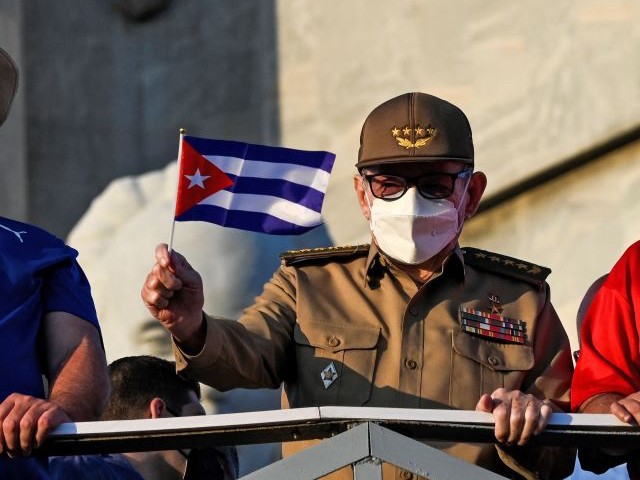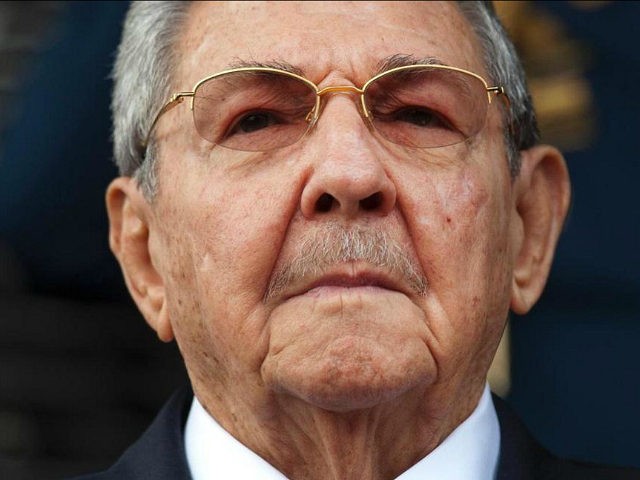Raúl Castro, the 91-year-old communist former dictator of Cuba who served for decades as elder brother Fidel Castro’s top executioner, this week unretired from politics to appear on the ballot as a “candidate” for the Cuban parliament in next month’s “election.”
Castro’s return breaks a promise he made upon his full retirement in 2021 to leave power for good.
As a repressive communist regime, Cuba does not hold free or fair elections. Its bureaucracy occasionally nominates trusted communists for positions in the country’s legislature, the National Assembly of the People’s Power, who appear uncontested on local ballots.
The Communist Party has scheduled its next “election” for March 26. The Assembly is expected to have 470 members after that election, 135 fewer than its last five-year session due to Cuba’s dramatic population decline, a result of a mass exodus ongoing today.
Regime officials fabricate misleading high turnouts by pressuring locals to participate in the farce; not doing so may risk access to food, their regime-controlled jobs, or their homes. Openly objecting to a candidate or attempting to run an anti-communist political campaign could result in arrests and long-term imprisonment. Even expressing mild dissent could result in prison time. In one prominent example, in December, the Communist Party sentenced Havana resident Carlos Ernesto Díaz González to upwards of two years in prison for saying publicly, “I don’t want to be a communist.”
Raúl Castro will appear on the “ballot,” all but guaranteeing him a lawmaker seat representing his native eastern Santiago de Cuba, alongside the nation’s “president,” Miguel Díaz-Canel. Castro gifted the presidency to Díaz-Canel in 2018, claiming he would “retire” from public life due to his age. Díaz-Canel has served as a figurehead for the dominant Castro dynasty, still led by Raúl, and stated transparently in his first speech as “president,” “Raúl will remain at the forefront of the political vanguard.”
Díaz-Canel will represent central Santa Clara if elected in his rigged “election,” a position from which the Assembly is likely to renominate him to serve as “president.”

Former president Raul Castro participate in the commemoration of May Day (Labour Day) to mark the international day of the workers, at Havana’s Revolution Square, on May 1, 2022. (YAMIL LAGE/AFP via Getty Images)
Also appearing on the ballots this year is Elián González, a current Cuban tourism official who began his public life as a five-year-old refuge, abducted away from his family and forced to live under a brutal communist regime by leftist President Bill Clinton in 2000. Now 29, González, who the regime regular parades as a trophy against the United States, will soon likely represent his native Matanzas province in the National Assembly.
Castro’s return to the spotlight is the most noteworthy of the individuals “nominated” to serve as lawmakers. Castro has largely attempted to remain outside of the public political eye since his official retirement in 2021.
“I will continue to militate as one more revolutionary combatant, willing to offer my modest contribution until the end of life,” Castro said at the time. “I fervently believe in the strength and valor of the example and understanding of my compatriots. So long as I live, I will be ready with my foot in the stirrup to defend soclaism.”
That belief appears to have eroded significantly during Díaz-Canel’s disastrous solo tenure at the helm of the country. Protests of a size unseen in Cuba since the 1990s erupted in nearly every municipality of the country on July 11, 2021, almost three months to the day that Castro stepped down as the chairman of the Communist Party. Violent repression of dissidents, including door-to-door raids and the imprisonment of dozens of children, has done little to stop the movement that began that day. Cubans held nearly 4,000 protests against communism on the island throughout 2022 despite American and other foreign corporate media largely giving up on covering the movement shortly after the July 11 protests.
Díaz-Canel has also presided over a catastrophic Chinese coronavirus response, ceaseless blackouts that have fueled the protests and damaged the tourism industry, and a massive fire at an oil depot in Matanzas that devastated the local enviroment and jeopardized the country’s fuel supply.
The official newspaper of the Communist Party, Granma, announced that Castro had been “nominated” to serve as a lawmaker on Sunday. Another relic of the Cuban Revolution, 90-year-old Castro loyalist Ramiro Valdés, will also appear on ballots in Artemisa, a suburb of Havana – a second vote of no confidence for the Díaz-Canel generation of communist rulers.
The members of the National Assembly of the People’s Power are chosen through a process in which local “candidate commissions,” run by Communist Party enforcers, choose the candidates, and local delegations get to approve or disapprove of the candidate. Cuba does not allow “precandidates” to appear before the delegations who have a history of political dissidents or offer ideas divergent from Communist Party orthodoxy. The delegations very rarely reject candidates because the vote on those the Party hand-picks is public – a dissenting delegate has to raise their hand in front of the crowd, exposing them to Party retribution.
Despite this, Granma claimed that local delegations rejected two candidates in Camagüey province, but did not name them or elaborate on the circumstances surrounding the situation. Cuban journalist René Gómez Manzano, writing for the independent outlet Cubanet, noted that local coverage in Camagüey did not report that such a thing had happened, leaving unclear exactly what transpired during that province’s votes.

COMMENTS
Please let us know if you're having issues with commenting.